#it was always going to be heavy since it begs us to question autonomy and agency and 'normalcy' w in society
Text
challe is SO roiben coded omg
#they are watching that cute fairy anime and it had some heavy hitting plot points now...#it was always going to be heavy since it begs us to question autonomy and agency and 'normalcy' w in society#and also like power/gender/authority/war but so far it has mostly been subtle and overshadowed by the protags goals and the cheery season 1#but now we're getting into the meat of it i'm so intrigued#you CAN have romance and heart fluttery moments paired w insight and social criticism and complec narrative...!!#🫶🏼#sugar apple fairy tale#okay the post i made and the tags should be flipped oopsies#also i'm talking abt roiben from tithe by holly black if anyone was wondering...😸👉🏼👈🏼
5 notes
·
View notes
Text
Passion
Link to part 1: http://zalrb.tumblr.com/post/164720175550/trust-jonsa-one-shot
Link to part 2: http://zalrb.tumblr.com/post/181817838525/an-entirely-different-way-pt-2
I was inspired to keep on going. Hope you guys like it! Once again, I’m not heavy into GoT, like I’m not too good with Houses and with customs etc. etc. so bear with me.
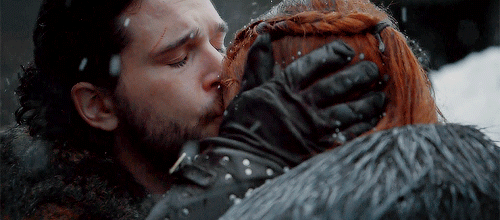
Sansa could hear it as she strode through the corridors. Giggling. Whispering. It was coming from an empty chamber. Choruses of “shh!” “shh!” and more guffawing. She was on her way to a council with Jon and the others but her curiosity got the best of her and she stopped outside of the room in question, its door half-closed, and saw a few servants huddled together.
“I mean, it makes sense doesn’t it? Nothing makes a man lose his senses like a good roll in the hay.”
The laughing stopped the minute Sansa made her presence known and the servants disassembled from a circle and formed a line, bowing their heads to her.
“Lady Stark,” they intoned.
She closed the door fully and walked closer to where they stood. “What is it that you are all talking about?”
No one said anything. She sighed.
“I know that you’re all gossiping in here, just tell me what it is.”
Two servants exchanged nervous glances. “Forgive us, Lady Stark---”
“You’re not in any trouble,” she said with a slight smile. “I’m just … curious. Indulge me.”
A woman started to speak. “Lady Stark, we … … we heard a rumour---”
“Yes,” said Sansa, nodding. “That much has been made clear.” She regarded them. “Out with it.”
There was another pause before the woman continued speaking. “One of the servants, I’m not sure who exactly, heard some of the boat crew talking,” she said. “And…”
Sansa stared at her. Her heart began to race as dread creeped up on her and started squeezing her chest: maybe she didn’t want to hear the answer. Maybe it was a rumour that would shatter something inside of her. It was the only explanation for the sense of impending doom that was disrupting her body.
“His Grace, Lord Snow, he and the Targaryen woman … they … they had relations on the boat…”
“That is the gossip anyway, my Lady,” said a man.
Nothing could have prepared Sansa for those words; they struck her like a slap and she felt winded with the impact. More than that she felt betrayed in a way she hadn’t expected. There was an intimacy to her sense of betrayal, an intimacy that shook her because it made her feel as if Jon had been unfaithful rather than traitorous, adulterous even and that only spawned a familiar confusion in Sansa, the one that had plagued her after every interaction she’d had with Jon since he came back.
It was as if her insides were being ripped apart with the whirlwind of conflicting emotions and all she could do to hold herself together was remove herself from them, block herself from the surprising pain and all of its implications, turn herself into steel, into that statuesque demeanour she found herself inhabiting more and more.
“Thank you, that will be all,” she said. Her jaw tight. “You can get back to your duties.”
“My Lady.”
Jon sat opposite Daenerys at a long wooden table covered with maps and documents. He was staring down at nothing in particular, stewing in a broody silence that infected the entire room. Daenerys had seen moments of this beforehand but nothing quite so long-lasting.
“It is unlike Sansa to be late,” he said.
Daenerys regarded him. “You’re worried about her?”
“I’m …” He gesticulated. “Regretful that we haven’t been getting along lately.”
“Because of me,” said Daenerys.
“No, because she doesn’t trust me. Because she’s stubborn. Because she doesn’t have faith in my loyalty to---” He cut himself off and shook his head.
Daenerys saw the heartbreak in Jon’s eyes as he said those words, heard the way his voice quickened with frustration and with a need, even then, to make his sister understand his choices --- he was always with Sansa, he carried her with him, and all of their impassioned discussions.
“Well anyone with eyes could see how much you love …” she licked her lips. “The North,” she finished diplomatically. “Perhaps she just needed some time to gain perspective.”
“Well then she would’ve done it after the meeting not before,” said Jon gruffly.
The door opened and he started but when he saw Davos walk in the room, he sat back in his chair, crestfallen.
“Your Grace,” he said swiftly. He stopped in the middle of the room and spoke just as quickly.
“You need to talk to your crew. They’re undisciplined and they have big mouths.”
Daenerys stood up. “I beg your pardon?”
Jon raised his hands in a calming manner, looking from Daenerys to Davos and then spoke.
“What is it?”
“There seems to be a rumour going around,” said Davos.
Daenerys looked at him, her head cocked upward and Jon narrowed his eyes at Davos’ awkward expression.
“A rumour that you two had …”
Jon didn’t need Davos to finish the sentence. Everything inside of him shifted. He could hear Daenerys scoff at the accusations, at Davos discussing methods to suppress the gossip but their words were distant echoes in his ears. He suddenly felt sick with worry, with anxiety.
“Did Sansa hear?” he whispered.
They continued to talk.
He cleared his throat. “Did Sansa hear?” he said more loudly.
“Uh…” Davos shrugged. “I’m not sure if any of your siblings heard, Your Grace, right now it seems to be confined to the common folk, I ---”
“I need to find her,” said Jon. He looked to Daenerys. “Excuse me.”
Jon walked into Sansa’s room without knocking, closing the door behind him. She was sitting at her desk, looking over documents. Although he was restless, he didn’t dare speak but she did nothing to acknowledge his presence in her chambers. He wanted to pace but he also wanted to stay still, he wanted to shout at her to look at him but he also wanted to give her the first word. He was unusually ambivalent and unusually frazzled and he couldn’t understand the guilt that was the source of his agitation.
Finally, she spoke.
“Do you love her?” she asked quietly, her eyes still on the document in front her.
“Sansa----”
“Do. You. Love. Her.”
Jon sighed and hung his head then took a couple of steps closer to her desk. Finally she looked at him. Her eyes blazing with that wintry fire he so admired, that wintry fire that contradicted the coolness of her speech. She shrugged her shoulders.
“I don’t know if it would make this mean something or feel like it means something if you were in love with her.”
“Sansa, stop it.”
“Well surely,” she leaned back in her chair and shook her head, “if you are going to give away our autonomy, our freedom, it should be for love, should it not?”
“Sansa.”
She stood up and slammed her hands on the desk. “You tried to make me feel like a fool for questioning your motivations for this decision.”
“Well you were being a bit foolish,” Jon snapped back. “You’re being foolish right now!”
“Am I?” she yelled. Her pretence of aloofness cracking. “Because the last time someone from our family made a decision based on a woman, he ended up dead! My mother ended up dead! Northerners ended up dead! I told you you had to be smarter than Father, that you had to be smarter than Robb! And you’re making the same mistakes---”
Jon slammed his hands on the desk now too, his face inches away from Sansa’s. “I am not making the same mistakes!” he yelled. “I would never do anything to put the North at risk, to put Arya and Bran at risk, to put you at risk, Sansa! How many times do we have to have the same argument?”
“Until you convince me!” The shrillness of her own yelling surprised Sansa, it was a mark of how personal she was taking the entire situation and she tried to regain some emotional distance.
“Do you know how weak this makes us look? The King in the North now a puppet because he doesn’t think with his head!”
“Sansa, that’s enough!” He took a beat. “I would never---!”
“Oh, you’re too blinded that you don’t even see it!”
Swiftly, Sansa wrenched her eyes from Jon’s gaze and turned her back to him, rubbing her forehead with her right hand. She was feverish, her skin was hot to the touch.
“Too blinded to see what?” said Jon.
He waited for a response and when he didn’t get one, something in him compelled him to shout. “What am I too blinded to see?”
Sansa whirled around. “That you have chosen her!” she yelled. “Over --- over---” Me, she screamed internally. You chose an outsider over me! And I hate it and I don’t know why I hate it this much!
Jon walked around the desk to her, he touched her shoulder but she couldn’t bear the thought of him holding her with the same hands he held her and she stepped out of his reach. While Jon itched to try again, he stayed where he was, giving her the space that she demanded, as he had and would continue to ensure that never again would she be touched unless she’d wanted to be.
She stared at him, breathing heavily and he shook his head, doing his best to calm the rage within him. He took a step toward her and stopped, maintaining a distance. “I---” he pressed his lips together. “I never knew you thought so little of me.”
She rolled her eyes. “That isn’t what I’m saying.”
“Isn’t it?” he countered. “If you so … passionately believe that I would put everything and everyone at risk for something as crude as sex or as selfish as love then I ---”
“So you do love her,” she said severely, her eyes flashing.
He looked at her wearily. “Look, I loved a woman once,” he said. “A Wildling woman, her name was Ygritte and even my love for her couldn’t come before my duty to the Night’s Watch, what makes you think anything can come before my duty to ---” You. “My people?”
“You love her,” she repeated.
Jon gritted his teeth, opening and closing his fists. “Why do you keep saying that?”
“Why don’t you deny it?” she retorted.
He looked at her, his mouth agape, as something --- a new emotion --- tickled his chest. Something that felt a bit like hope or a bit like delight.
“The possibility bothers you that much?” he said.
“Maybe no more than how much seeing me dance with Lord Cerwyn bothered you,” she said harshly.
Sansa didn’t know what she was saying before she’d said it and almost said something to take it back but when she saw the way Jon’s face darkened, she realized this was the reaction she wanted from him.
“Are you saying it’s the same thing?” he asked.
“Which is what exactly? Love or camaraderie?”
“You’re being impossible, Sansa.”
“Either way, it probably isn’t the same, Jon.” Her words were spilling out of her. “Considering that I would never put him before you and you love your silver-haired queened more than----”
“Than what?” he said, his anger returning. “More than what, Sansa, I want to hear you say it.” He touched her wrist and when she didn’t move away this time, he took both of her hands in his, her nails digging into his skin.
“I want to hear you say your cruelest insult to me!” he said, leaning into her face.
She jutted hers into his. “It isn’t an insult if it’s the truth!”
“You believing something so stubbornly doesn’t make it true!” he said, holding onto her tighter. “I would never betray you.” He looked at her with an earnestness so fierce it made her legs weak. “I would never --- I would never put anyone else above you! I would never see you in danger ever again. I would never… I would never ---”
Neither of them knew who moved forward first only that they’d come together in a breathless embrace that ignited a spark within both of them. Jon’s hands no longer held Sansa’s, instead they held either side of her face while Sansa’s hands gripped his wrists, her body bowed toward him.
It was a kiss as contradictory as everything before it; the softness of Jon’s lips, the feel of them on her own unwound Sansa as release surged through her --- the taste of her tongue, the way her hands clenched his own filled Jon with an unparalleled relish but these emotions also triggered others, triggered questions they could feel rise within them, triggered more agitation, more … passion --- it did nothing to satiate.
Finally, they parted and Sansa sank toward the desk as Jon walked swiftly over to a wall so he could sag his weight against something solid. Now that they were apart, they could breathe again and they each took in the air with a gluttonous enthusiasm, trying to calm their thundering hearts, dry their teary eyes, still their racing minds. They dared not look at each other because now that they were apart, they could feel the pull between them; within each of them was an urge to snap back together, an urge so intense it was like a humming on their skin.
And afraid of what would happen if they stayed in the same place, afraid at his own longing to find out, to go to her, Jon hastily left the room without looking back to see Sansa gripping the desk with one hand and clutching her chest with the other.
#jonsa#sansa stark#jon snow#game of thrones#GoT#jon x sansa#sansa x jon#jonsa fanfiction#fanfiction#GoT fanfiction#kit harrington#sophie turner#angst
126 notes
·
View notes
Text
Did England Raise America?
It’s widely accepted in this fandom that England raised America. If you’ve ever seen or, unfortunately, got caught up in a shipping war concerning UsUk, it’s an argument I can guarantee you’ve seen be thrown around.
However, that argument is one I want to call into question. Because, the thing is...England DIDN’T raise America.
Throughout this analysis, I will cover why the two don’t qualify as an adopted family relationship. Both Hetalia canon and historical information will be used. I will also use this perspective to analyze the two as separate characters. All translated images used here are from hetarchive and hetascanlations.
One more thing! This analysis is not intended to convince you of anything as far as shipping is concerned. Whether England raised America and whether the UsUk relationship is romantic are two distinct topics. I have many motivations for writing this analysis. Trying to tell you what to ship is not one of them.
LOOKING AT IT HISTORICALLY
The first American colony was established in Jamestown, Virginia in 1607. The American Revolution started in 1775 and ended in 1783. If we were to say the American colonies were still considered colonies until the very end of the war, this would mean that Great Britain and the United States had a colony-colonizer relationship for 176 years. A relatively very short time period for a society to be established and then grow until finally declaring and winning Independence. So.
How did this happen so quickly?
The answer lies in the fact that, from nearly beginning to end, the British left the colonies to take care of themselves. Which makes sense logically when you think about it. Britain had its own regional issues and the distance provided by the Atlantic Ocean wasn’t making governing the American colonies any easier. So, Britain neglected to do so. The biggest British presence in the colonies came in the form of Royal Governors, but even their power was more theoretical than actual thanks to the power over the purse assemblies (which consisted of colonial elected officials rather than anyone appointed by the King) wielded over these governors. If a Royal Governor didn’t comply with the needs and wants of the those in the colonies, their paychecks were cut short. In they were compliant, they would get bonuses. This power over the Royal Governors only increased as time went on until the Assemblies were the main governing power in the colonies. (Source) (Source)
The most significant attempt at having any form of British policy came in the form of the Navigation Acts which were passed in the later part of the 17th century. The Navigation Acts were an attempt to regulate colonial trade, but what can I say other than they were very poorly enforced policies that failed on every level? Again, due to issues such as distance, it would have been more trouble than what it was worth to actually enforce the Navigation Acts so smuggling became a pretty common thing in the American colonies. (Source) (Source)
Unintentional neglect evolved into a degree of intentional neglect starting in the 1720s with the appropriately termed period of “Salutary Neglect” (though Great Britain started to loosen up its control even more than it already had starting back in the 1690s). Edmund Burke, who served as a member of British parliament, can be credited with naming this unofficial policy:
“That I know that the colonies in general owe little or nothing to any care of ours, and that they are not squeezed into this happy form by the constraints of watchful and suspicious government, but that, through a wise and salutary neglect, a generous nature has been suffered to take her own way to perfection; when I reflect upon these effects, when I see how profitable they have been to us, I feel all the pride of power sink, and all presumption in the wisdom of human contrivances melt, and die away within me.”
Starting in the 1720s with Robert Walpole’s (Great Britain’s unofficial first Prime Minister) rise to power, Great Britain intentionally started to turn a blind eye to colonial activity, particularly the already mentioned smuggling. The idea was that if the colonies were left alone to flourish, Great Britain would profit. This “let them do whatever” mentality lasted until the end of the French and Indian/Seven Years’ War, when heavy taxation started to take place in the colonies to pay for the war. And, thanks to the poor reception (to say the least) of the heavier taxes, Great Britain, for the first time since the colonies were first established, made more serious attempts to have a prominent presence in Colonial America (with things such as the “Intolerable Acts” and more taxation). This heavier presence combined with the previous long-time neglect is what led to the American Revolution that kicked off only 168 years after the first colony was established. (Source) (Source) (Source)
To sum this all up, Great Britain had a glaring lack of presence in its American colonies that led to a strong sense of autonomy. This sense of autonomy led to the American Revolution.
SO WHAT ABOUT HETALIA?
Now that it’s been established the notion of England raising America doesn’t make much sense from a historical perspective, it’s time to move on to Hetalia itself. After all, Hetalia doesn’t always perfectly match up with history so I can’t just end this on nothing but historical facts.
So, what about Hetalia then? What is the pre-Revolution relationship shared between America and England?
It’s one of absence and rapid growth. Let’s start from the beginning.
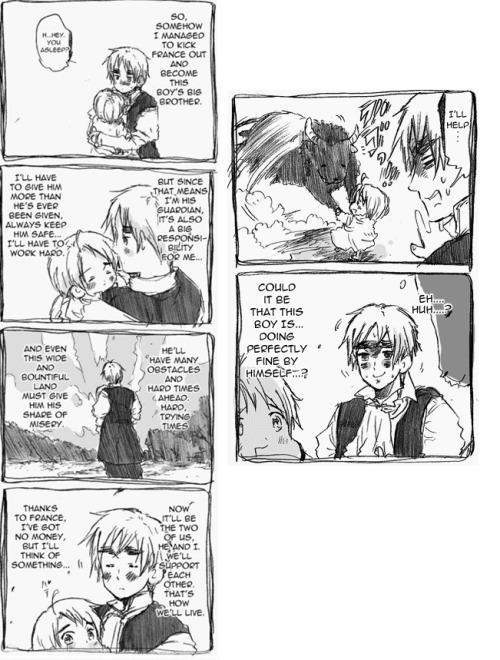
Here’s something from one of the earliest canon portrayals of colonial America. The strip starts out with England thinking of all the responsibilities he’d have to take on as America’s guardian. But the strip ends with England coming to the realization America is perfectly fine by himself, alluding to how the real-life colonies were self-sufficient without any British supervision. It’s a quick reference to colonial history, but one telling of what’s to come.

Here’s something a bit more telling. England leaves America and returns to find he’s developed into an adult or almost adult physical appearance. The first thing I want to talk about is young America’s reaction to England leaving him. While it’s not abnormal for a child to be upset when left alone, America is upset to the point of sobbing and begging England not to leave. Is that the type of reaction a child would normally have to being left by someone who was constantly around? No. Because normally the adult figure would return very shortly. But that’s not the case here. America is upset because he knows that once England is gone, he’s not going to stop by again any time soon.
Moving on to the second part of the strip, my first point seems to be proven right. Even with America’s quick physical growth, England must have been gone at least for a few years for such a dramatic physical change to have taken place. Speaking of, there’s that rapid colonial growth I was talking about earlier! We’ll get to see more of that later.
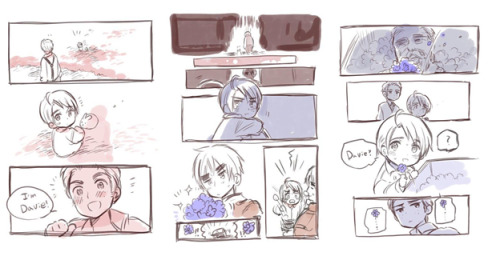
Now we move on to the Davie strip. The comic starts in Davie’s childhood and ends after his death. While I can’t say for sure, I’d guess this was a time span of 60-70 years and, judging by America’s appearance, took place during the earlier colonial years. Which leads me to suspect America’s growth started to REALLY speed up starting in the late 17th century, early 18th- around the time when Salutary Neglect was most prominent. Not long after the likely time Davie passed away.
So, 60-70 years. And America was a colony for only 176 years (less if you want to end at the beginning of the Revolution). And England has only two brief appearances, with each being many years apart going by Davie’s changing physical appearance. I think that information makes this comic the most telling in how often England was around colonial America.
It also makes thing a bit more tragic doesn’t it? The America I see here is that of a very lonely child who craves attention and company. So, he latches onto Davie, who is unfortunately a human that quickly passes away.

Moving on, we get a strip that shows America’s unusually fast growth. By the time he has a teenage body, Canada is still around toddler age. Also, worth mentioning is that America is seen with a book in both latter two panels and Canada’s way of approaching America and his wording in the very last one implies America is constantly busy. This is the diligent America I needed to see to completely match him up with colonial America in reality.
Here we do NOT see England holding his hand throughout this learning process. America is shown taking on the task of learning politics on his own and of his own free will. This is where the “England raised him” argument becomes extremely frustrating to me. Combine this strip with the one with the buffalo from earlier, and we get to see a hard-working, self-sufficient America that brought upon his own quick growth in the absence of his colonizer. A reminder not to take his modern obnoxious personality at face value. He is, in fact, VERY competent.
THE AMERICAN REVOLUTION
And with that, it’s time to talk about the American Revolution. I want to bring attention to the “I’m no longer your brother” line. This dialogue if often disregarded, since you can’t actually cut off familial relationships with words. However, I don’t that gives the full picture of what he means here. This is NOT a declaration of a sudden, immediate change.
Think back to everything I’ve talked about up to this point. America showing a capability of handling himself at a young age, England’s absence throughout his growth, America growing up extremely quickly, the diligence and dedication he showed in teaching himself throughout that speedy growth…
Again, he is not making any sudden declaration of cutting familiar ties. He’s acknowledging something that has already happened. America has proven he’s more than capable of being fully independent by raising himself up into someone capable of taking a stand against England in under the time span of 200 years. The child England found is gone and England needs to acknowledge that.
With that said, let’s talk about England for a moment. Particularly his state of mind throughout all of this.

In Europe, England had NOBODY. He was the black sheep, the guy with no friends. So, he turned to America, or rather the idea of America, as a source of comfort.
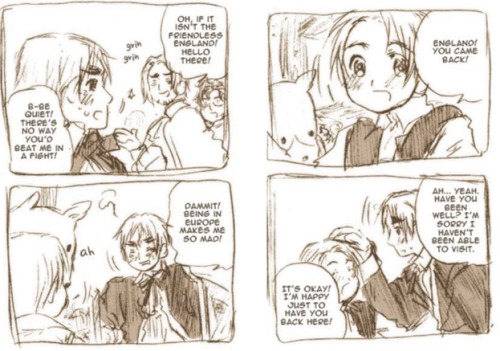
America became his emotional crutch. But, besides such a thing being unhealthy, his relationship with America was, for the most part, not something represented in reality. He liked the IDEA of there being someone there for him. Once you get attached to at least the idea of a person always being there for you, you don’t NEED to constantly be there with them. As long as America is there waiting for him when he does have the time to stop by, his imagination can do the rest with sugarcoating reality. This is an accurate take on the different perspectives of the British and the colonies, with more emotional investment thrown in to make England seem more sympathetic and human. The British thought of the colonies as an entity completely subordinate and loyal to Great Britain. But the colonists didn’t really see things in that way. All the time they had spent left to their own devices had built up a spirit of autonomy.
When the Revolution breaks out, he reacts to the possibility of abandonment violently. Of course, there’s practical reasons to not want to lose the American colonies. But in England’s case, he seems to be driven by his emotional investment and reliance on America. Everything builds up until England finally breaks down in the end.

It’s not the cutting of familial ties that makes this scene so tragic. It’s seeing reality catch up to England. It’s seeing his loneliness and fear of abandonment completely exposed. It’s seeing that he kept fighting even when he had no Army behind him (possibly because everyone else had already given up). It’s seeing even some of America’s soldiers giving England looks of pity. It’s seeing America looking down on him and commenting on his fallen image.
As sad as this is, it needed to happen. Being under another nation’s rule was becoming a hinderance to America’s further growth, and England had become unhealthily attacked to something that amounts only to a fantasy. The bond was a toxic one.
MODERN TIMES AND CONCLUSION
Keeping this section brief, I’ll end this analysis on this scene.
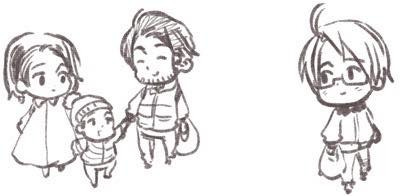

America says he’s jealous of the kids specifically. Because, these kids have something America himself didn’t get the chance to have: a fulfilling childhood loaded with consistent affection.
America didn’t have an affectionate childhood, he was mostly alone. Or put more accurately, he didn’t have much of a childhood AT ALL. His early days weren’t anything you can attach much familial love to. He was more like an orphan than someone under the loving care of a father/brother figure. He was alone, so he had to grow up and raise himself (in this case, that happened on a more literal and physical level).
Saying England “raised him” is a dramatic misrepresentation of what happened and it’s a dramatic misrepresentation of the depth both characters have.
England wasn’t upset over losing a son. He was upset over losing an emotional crutch that he rarely even got to see. He broke down, because of insecurities that were an issue far before the Revolution happened. His miserable appearance during the Revolution wasn’t just apart of some isolated event. It was a look into England’s very troubled and lonely mind.
America wasn’t just some kid who decided to rebel against daddy. He was someone who had thrown away his own childhood, so he could raise himself. Nobody was there to help him. What he accomplished was through his own hard work and he, understandably, wanted that to be recognized.
And to those of you who are still put off by the title “brother” being used in America’s colonial days, remember that it’s a title that’s used very loosely in the series with the biggest perpetrator being “big brother France”. In this way, having a “big brother” indicates having a friendly relationship with an older male, especially one in a higher position of power. Another example of non-related characters using “brother” to describe each other are Norway and Denmark (with Denmark also addressing Iceland as such and overall thinking of himself as a “big bro”).

#hetalia#usuk#aph america#aph england#axis powers hetalia#aph denmark#analysis#arthur kirkland#alfred f jones
385 notes
·
View notes
Text
January 08, 2018
Dear Janis,
It’s been a very hard day, and it’s only 4:15PM. Over the past two days, my boyfriend has been bleating about feeling sick. I did what I knew best to do, which was monitor his symptoms, treat those I could with over the counter medicine, and keep him hydrated. His temperature has been fluctuating since, ranging from 98° to 102°, but he seemed to be strong, and never insisted he needed to go to the doctor. Not until last night, at least.
Being brought up the way I did, the only fever I ever considered “dangerous” was a fever of 103°+, or a fever that just wouldn’t go away after a couple days. Last night, after insisting he needed to go to work, I took Chomp’s temperature again, and he was at 98°. It was such a relief, because I finally thought he was past what I assumed was a cold.
Unfortunately, this morning, I woke up next to him claiming to feel better, but suffering from a bad cough. I took his temperature again, and the thermometer read 103°. At that point, I knew something worse than a cold was taking hold of him, and that it was time to take him to a clinic. That suggestion didn’t go over well, sadly and surprisingly.
He insisted that all he needed was this homeopathic medicine a friend recommended, but I tried to convince him that was a waste of time, and that he probably shouldn’t drive. He took that, as he so often does, as an assault on his autonomy. He tried leaving, and I begged him to stay, even going as far as to block the door. He responded by marching over to the balcony door, presumably intending to jump off.
I stood in his way again, begging him to listen, and he responded by screaming at me to get out of his way. “Nothing you have suggested has worked,” he shouted. “NOTHING YOU’RE DOING IS HELPING!” I begged him to please let me take him to the clinic, and he walked out of the apartment, informing me that he would be walking down to a nearby drug store.
I followed him, repeatedly stopping and imploring him to get in the car. He ignored me each time. Finally, I just drove to the drug store and waited for him to find what he was looking for. I asked him once again if we could go to the clinic, and he responded by saying he was not going to be controlled by anyone, and insisted that he was finished with me if I did not give him space.
He settled for some expensive vitamin gummies, which he was likely getting from the vitamins I had been giving him for days. I then asked him if I could at least drive him home, and he agreed.
I drove him to the clinic, instead. At that point, I was resolved to find out what was going on with him. If it meant him ending the relationship, then that’s what it meant.
After waiting nearly an hour, while Chomp’s rested in the car, I was able to catch the clinic physician before she went on lunch —which would have forced us to wait for another hour — and persuaded her to see him first. By the grace of herself and God, she agreed. Shortly after, Chomp’s was diagnosed with Influenza B.
He’s since taken his first dose, and is presently resting in our bed. God willing, his fever should be gone in two days, and the virus should be dead within a week. I just went in to check on him, and he claims to feel terrible for the things he said to me. I feel terrible, too. I feel terrible for not being smart enough to recognize what this was the flu; I feel terrible that he has to suffer this damn virus; I feel terrible for all the theatrics that transpired this morning; and I feel terrible for not knowing how else to handle the aforementioned situation.
What hurts me most, however, and what has been festering in the back of my mind since, is something he said to me on the way from the drug store to the clinic: He accused me of being controlling, and of always trying to control him.
No matter how hard I try to pacify him, and temper myself in his eyes, he seems to see me as someone who is trying to thwart and manage him. Having never been in a serious relationship, I’m honestly not sure where the line between care and control lies, especially in his eyes. Rules are different for him, and he doesn’t tolerate emotions well. He apparently sees compassion as weakness and concern as intrusive.
That being said, one of the reasons I love this man so much, is because he is a force of nature. He is the only man I’ve ever met who is as untamed and freewheeling as I used to think I was. Somewhat unlike me though —or perhaps to a greater degree— he plays by his own rules, is defined by his own terms, and finds resolve by what he perceives to be true. Once his mind is made up, it is very hard to help him see any other way.
We’ve often joked that, rather than getting a “his side/his side” sign to put over over our respective sides of the bed, we should instead get one that reads: “Unstoppable Force; Immovable Object”.
At his best, he is brilliant, warm, humorous, hardworking, and collaborative. At his worst, he’s stubborn, capricious, callous, indolent, and indifferent. He’s a storm, just like me. I know that he is not manageable, which is why I never consciously tried. I do recognize, however, that he is too often self-defeating and blind to his own virtue and abilities. He also vilifies many of his friends and kin who seek only to bolster him.
That’s where I am, I think. I only want to help him achieve his utmost potential, and sometimes that requires heavy conversations. I don’t always know my limitations, or when I’m out of bounds, because his fluctuate as ferociously as his fever. I also don’t want to hold his hand or push too much, but I do want to help him. Until today, I thought he was starting to understand that. Now, I don’t know.
I don’t know if what I just said makes me controlling. Does it? If so, I would like to know, because I do not want to be controlling.
What do you do, though, when the person you love is acting too stubborn to do what’s best for them? There are so many questions presently plaguing my mind. Should I have let him make his own decision this morning and waste his money on a remedy that would not have worked? Should I have let this flu debilitate him? Did I do the right thing? Will he ever forgive me for trying to help him? Is our relationship over already?
I don’t know the answers to any of those questions, and I honestly don’t even know how to proceed. My heart still hurts from the events of today. I often wonder if we’re both just freaking out over the increasing reality that we are becoming a codependent couple. We both seem to operate under the same conviction that —no matter what— we are in this world alone, and the most important goal that we must achieve in this life is survival.
I hope time brings me clarity. I was hoping this entry would, but I was likely expecting too much. It has helped, though. Much is out of my mind, and I feel a little better.
Admittedly, the past two days of brevity have been expressed here today. This has largely been on my mind for the past two days. Sudden financial issues have gripped me as well, but this is really it. This has been eating at me.
Can I be loved or am I just too much to bear? Can I be of use or am I just too damaged to help anyone?
I’ve been trying so hard to love myself, and I sometimes think I’m getting there, but then someone points out another insufferable flaw of mine, and I once again feel defective.
I don’t know if it’s right to love myself when I’m clearly flawed; I thought that’s how narcissist are born.
I still have work to do and room to grow.
Goodnight, Janis.
0 notes
Text
Did England Raise America?
(NOTE: I have spent so much time reuploading this only to find apparently linking sources is a no-no. If you want to know where I got the historical information from, do not hesitate to ask!)
It’s widely accepted in this fandom that England raised America. If you’ve ever seen or, unfortunately, got caught up in a shipping war concerning UsUk, it’s an argument I can guarantee you’ve seen be thrown around.
However, that argument is one I want to call into question. Because, the thing is...England DIDN’T raise America.
Throughout this analysis, I will cover why the two don’t qualify as an adopted family relationship. Both Hetalia canon and historical information will be used. I will also use this perspective to analyze the two as separate characters. All translated images used here are from hetarchive and hetascanlations.
One more thing! This analysis is not intended to convince you of anything as far as shipping is concerned. Whether England raised America and whether the UsUk relationship is romantic are two distinct topics. I have many motivations for writing this analysis. Trying to tell you what to ship is not one of them.
LOOKING AT IT HISTORICALLY
The first American colony was established in Jamestown, Virginia in 1607. The American Revolution started in 1775 and ended in 1783. If we were to say the American colonies were still considered colonies until the very end of the war, this would mean that Great Britain and the United States had a colony-colonizer relationship for 176 years. A relatively very short time period for a society to be established and then grow until finally declaring and winning Independence. So.
How did this happen so quickly?
The answer lies in the fact that, from nearly beginning to end, the British left the colonies to take care of themselves. Which makes sense logically when you think about it. Britain had its own regional issues and the distance provided by the Atlantic Ocean wasn’t making governing the American colonies any easier. So, Britain neglected to do so. The biggest British presence in the colonies came in the form of Royal Governors, but even their power was more theoretical than actual thanks to the power over the purse assemblies (which consisted of colonial elected officials rather than anyone appointed by the King) wielded over these governors. If a Royal Governor didn’t comply with the needs and wants of the those in the colonies, their paychecks were cut short. In they were compliant, they would get bonuses. This power over the Royal Governors only increased as time went on until the Assemblies were the main governing power in the colonies.
The most significant attempt at having any form of British policy came in the form of the Navigation Acts which were passed in the later part of the 17th century. The Navigation Acts were an attempt to regulate colonial trade, but what can I say other than they were very poorly enforced policies that failed on every level? Again, due to issues such as distance, it would have been more trouble than what it was worth to actually enforce the Navigation Acts so smuggling became a pretty common thing in the American colonies.
Unintentional neglect evolved into a degree of intentional neglect starting in the 1720s with the appropriately termed period of “Salutary Neglect” (though Great Britain started to loosen up its control even more than it already had starting back in the 1690s). Edmund Burke, who served as a member of British parliament, can be credited with naming this unofficial policy:
“That I know that the colonies in general owe little or nothing to any care of ours, and that they are not squeezed into this happy form by the constraints of watchful and suspicious government, but that, through a wise and salutary neglect, a generous nature has been suffered to take her own way to perfection; when I reflect upon these effects, when I see how profitable they have been to us, I feel all the pride of power sink, and all presumption in the wisdom of human contrivances melt, and die away within me.”
Starting in the 1720s with Robert Walpole’s (Great Britain’s unofficial first Prime Minister) rise to power, Great Britain intentionally started to turn a blind eye to colonial activity, particularly the already mentioned smuggling. The idea was that if the colonies were left alone to flourish, Great Britain would profit. This “let them do whatever” mentality lasted until the end of the French and Indian/Seven Years’ War, when heavy taxation started to take place in the colonies to pay for the war. And, thanks to the poor reception (to say the least) of the heavier taxes, Great Britain, for the first time since the colonies were first established, made more serious attempts to have a prominent presence in Colonial America (with things such as the “Intolerable Acts” and more taxation). This heavier presence combined with the previous long-time neglect is what led to the American Revolution that kicked off only 168 years after the first colony was established.
To sum this all up, Great Britain had a glaring lack of presence in its American colonies that led to a strong sense of autonomy. This sense of autonomy led to the American Revolution.
SO WHAT ABOUT HETALIA?
Now that it’s been established the notion of England raising America doesn’t make much sense from a historical perspective, it’s time to move on to Hetalia itself. After all, Hetalia doesn’t always perfectly match up with history so I can’t just end this on nothing but historical facts.
So, what about Hetalia then? What is the pre-Revolution relationship shared between America and England?
It’s one of absence and rapid growth. Let’s start from the beginning.

Here’s something from one of the earliest canon portrayals of colonial America. The strip starts out with England thinking of all the responsibilities he’d have to take on as America’s guardian. But the strip ends with England coming to the realization America is perfectly fine by himself, alluding to how the real-life colonies were self-sufficient without any British supervision. It’s a quick reference to colonial history, but one telling of what’s to come.
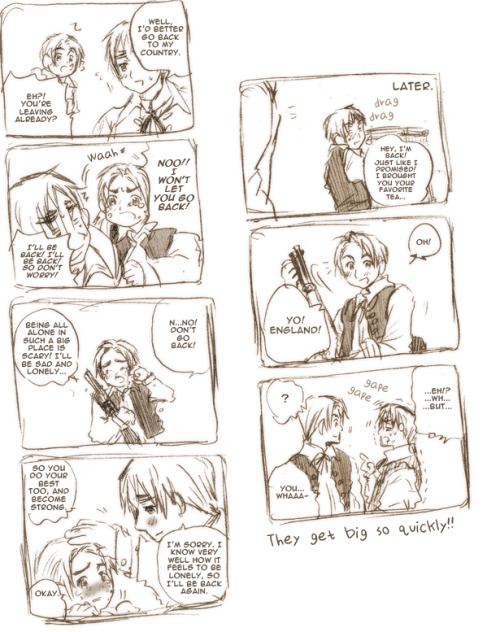
Here’s something a bit more telling. England leaves America and returns to find he’s developed into an adult or almost adult physical appearance. The first thing I want to talk about is young America’s reaction to England leaving him. While it’s not abnormal for a child to be upset when left alone, America is upset to the point of sobbing and begging England not to leave. Is that the type of reaction a child would normally have to being left by someone who was constantly around? No. Because normally the adult figure would return very shortly. But that’s not the case here. America is upset because he knows that once England is gone, he’s not going to stop by again any time soon.
Moving on to the second part of the strip, my first point seems to be proven right. Even with America’s quick physical growth, England must have been gone at least for a few years for such a dramatic physical change to have taken place. Speaking of, there’s that rapid colonial growth I was talking about earlier! We’ll get to see more of that later.
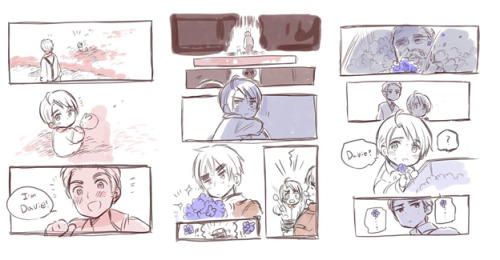
Now we move on to the Davie strip. The comic starts in Davie’s childhood and ends after his death. While I can’t say for sure, I’d guess this was a time span of 60-70 years and, judging by America’s appearance, took place during the earlier colonial years. Which leads me to suspect America’s growth started to REALLY speed up starting in the late 17th century, early 18th- around the time when Salutary Neglect was most prominent. Not long after the likely time Davie passed away.
So, 60-70 years. And America was a colony for only 176 years (less if you want to end at the beginning of the Revolution). And England has only two brief appearances, with each being many years apart going by Davie’s changing physical appearance. I think that information makes this comic the most telling in how often England was around colonial America.
It also makes thing a bit more tragic doesn’t it? The America I see here is that of a very lonely child who craves attention and company. So, he latches onto Davie, who is unfortunately a human that quickly passes away.
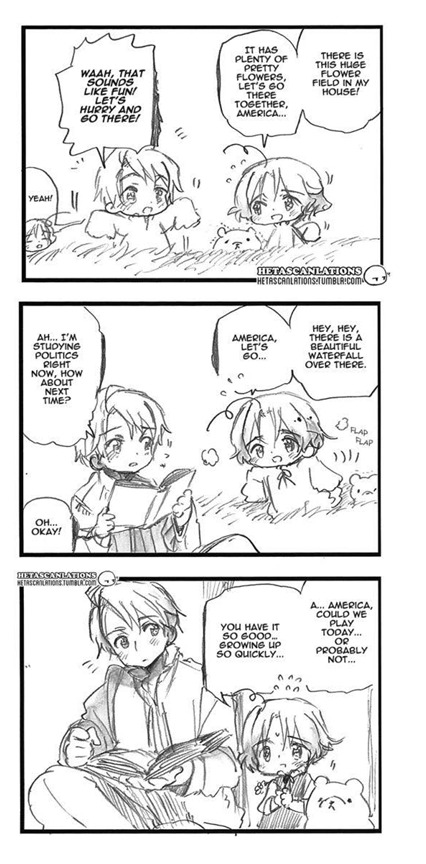
Moving on, we get a strip that shows America’s unusually fast growth. By the time he has a teenage body, Canada is still around toddler age. Also, worth mentioning is that America is seen with a book in both latter two panels and Canada’s way of approaching America and his wording in the very last one implies America is constantly busy. This is the diligent America I needed to see to completely match him up with colonial America in reality.
Here we do NOT see England holding his hand throughout this learning process. America is shown taking on the task of learning politics on his own and of his own free will. This is where the “England raised him” argument becomes extremely frustrating to me. Combine this strip with the one with the buffalo from earlier, and we get to see a hard-working, self-sufficient America that brought upon his own quick growth in the absence of his colonizer. A reminder not to take his modern obnoxious personality at face value. He is, in fact, VERY competent.
THE AMERICAN REVOLUTION
And with that, it’s time to talk about the American Revolution. I want to bring attention to the “I’m no longer your brother” line. This dialogue if often disregarded, since you can’t actually cut off familial relationships with words. However, I don’t that gives the full picture of what he means here. This is NOT a declaration of a sudden, immediate change.
Think back to everything I’ve talked about up to this point. America showing a capability of handling himself at a young age, England’s absence throughout his growth, America growing up extremely quickly, the diligence and dedication he showed in teaching himself throughout that speedy growth…
Again, he is not making any sudden declaration of cutting familiar ties. He’s acknowledging something that has already happened. America has proven he’s more than capable of being fully independent by raising himself up into someone capable of taking a stand against England in under the time span of 200 years. The child England found is gone and England needs to acknowledge that.
With that said, let’s talk about England for a moment. Particularly his state of mind throughout all of this.

In Europe, England had NOBODY. He was the black sheep, the guy with no friends. So, he turned to America, or rather the idea of America, as a source of comfort.
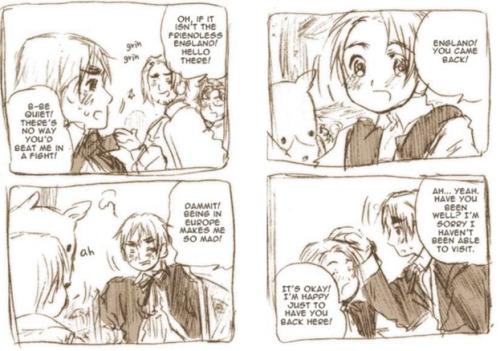
America became his emotional crutch. But, besides such a thing being unhealthy, his relationship with America was, for the most part, not something represented in reality. He liked the IDEA of there being someone there for him. Once you get attached to at least the idea of a person always being there for you, you don’t NEED to constantly be there with them. As long as America is there waiting for him when he does have the time to stop by, his imagination can do the rest with sugarcoating reality. This is an accurate take on the different perspectives of the British and the colonies, with more emotional investment thrown in to make England seem more sympathetic and human. The British thought of the colonies as an entity completely subordinate and loyal to Great Britain. But the colonists didn’t really see things in that way. All the time they had spent left to their own devices had built up a spirit of autonomy.
When the Revolution breaks out, he reacts to the possibility of abandonment violently. Of course, there’s practical reasons to not want to lose the American colonies. But in England’s case, he seems to be driven by his emotional investment and reliance on America. Everything builds up until England finally breaks down in the end.

It’s not the cutting of familial ties that makes this scene so tragic. It’s seeing reality catch up to England. It’s seeing his loneliness and fear of abandonment completely exposed. It’s seeing that he kept fighting even when he had no Army behind him (possibly because everyone else had already given up). It’s seeing even some of America’s soldiers giving England looks of pity. It’s seeing America looking down on him and commenting on his fallen image.
As sad as this is, it needed to happen. Being under another nation’s rule was becoming a hinderance to America’s further growth, and England had become unhealthily attacked to something that amounts only to a fantasy. The bond was a toxic one.
MODERN TIMES AND CONCLUSION
Keeping this section brief, I’ll end this analysis on this scene.
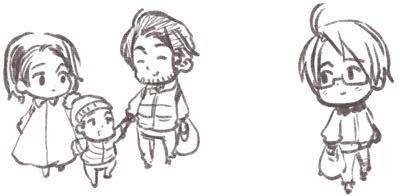

America says he’s jealous of the kids specifically. Because, these kids have something America himself didn’t get the chance to have: a fulfilling childhood loaded with consistent affection.
America didn’t have an affectionate childhood, he was mostly alone. Or put more accurately, he didn’t have much of a childhood AT ALL. His early days weren’t anything you can attach much familial love to. He was more like an orphan than someone under the loving care of a father/brother figure. He was alone, so he had to grow up and raise himself (in this case, that happened on a more literal and physical level).
Saying England “raised him” is a dramatic misrepresentation of what happened and it’s a dramatic misrepresentation of the depth both characters have.
England wasn’t upset over losing a son. He was upset over losing an emotional crutch that he rarely even got to see. He broke down, because of insecurities that were an issue far before the Revolution happened. His miserable appearance during the Revolution wasn’t just apart of some isolated event. It was a look into England’s very troubled and lonely mind.
America wasn’t just some kid who decided to rebel against daddy. He was someone who had thrown away his own childhood, so he could raise himself. Nobody was there to help him. What he accomplished was through his own hard work and he, understandably, wanted that to be recognized.
And to those of you who are still put off by the title “brother” being used in America’s colonial days, remember that it’s a title that’s used very loosely in the series with the biggest perpetrator being “big brother France”. In this way, having a “big brother” indicates having a friendly relationship with an older male, especially one in a higher position of power. Another example of non-related characters using “brother” to describe each other are Norway and Denmark (with Denmark also addressing Iceland as such and overall thinking of himself as a “big bro”).
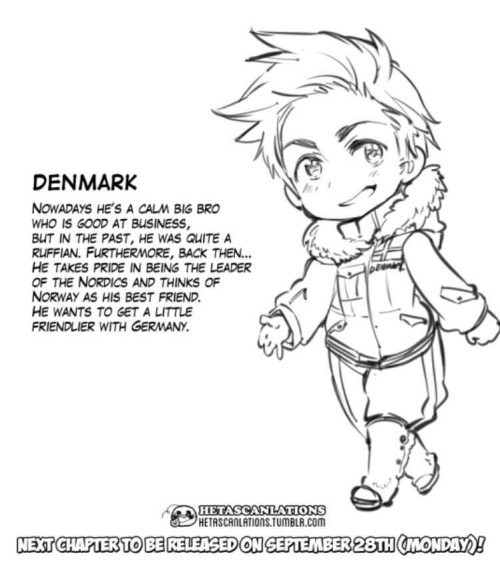
244 notes
·
View notes